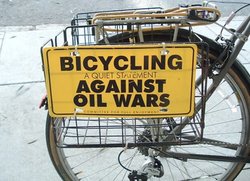Think of this as Volume 11, Number 3 of A-Clue.com, the online newsletter I’ve written since 1997. Enjoy.

I’m going to sound a little like George W. Bush here.
But there is a one size fits all solution to all our basic problems.
That solution is The War Against Oil. (Image from Bikecommutertips.)
To fight a War Against Oil means to make this your main priority, and to subordinate all other policies to it. It doesn’t just mean throwing a few subsidies to well-connected ethanol growers. It means making certain the market will accept any alternative energy coming in at a decent price, and tilting your market with taxes so that it favors cleaner sources over dirty ones. It means highlighting solutions in all public appearances, and making it the centerpiece of your rhetoric.
Unlike Bush’s one size fits all solution (tax cuts for rich frat boys) The War Against Oil actually works.
- The War Against Oil is foreign policy, because it makes us more energy independent and reduces the power of our oil-exporting adversaries.
- The War Against Oil is terror policy, because the new forms of energy can be dispersed, as you will see.
- The War Against Oil is environmental policy, because clean energy means reducing the use of hydrocarbons.
- The War Against Oil is technology policy, creating new jobs through new research.
- The War Against Oil is education policy, since the required knowledge cuts across so many disciplines.
- Perhaps most important, the War Against Oil is economic policy.
The War Against Oil is the issue on which to center our new political Thesis, that of the Internet, and that finding is justified by the history our chattering classes are now so intent upon.

Our current problem is stagflation — stagnant growth with inflation — caused by an oil shock.
What our present government has done is to bring energy prices back to where they were nearly 30 years ago, in real terms. They have tripled the cost of this key economic input, and even though we need less energy to make money than we did before, the net economic effect is the same.
So just as in the 1970s the normal "solutions" offered by both parties won’t work. You can’t lower interest rates, because you’re cutting the cost of money below the inflation rate. You can’t use economic stimulus because you just have more people bidding for limited energy, driving up its price.
When we faced this problem in the late 1970s we were given a choice, which was summarized by The Onion in a graphic on the 1980 campaign, part of the book "Our Dumb Century."
Carter: Let’s Talk Better Gas Mileage
Reagan: Kill the Bastards.
We chose to kill the bastards. We’ve been killing the bastards ever since. We solved stagflation with war. And in the near term, it worked. But now look at the cost.

After 28 years it is becoming self-evident, even to Americans, that killing the bastards won’t work any more. We have to dramatically reverse course. We have to go down the road not taken in 1980, the Carter road. (If Democrats are smart they will devote the first night of this year’s convention to Jimmy Carter. Picture from MSNBC)
Only a War Against Oil can dramatically cut the cost of energy, the key input of our real economy. Wars won’t work any more. Even if they could work, they would be counter-productive, because they would be fought on behalf of global warming.
The answers to the problem are all around us. Conservation is a big part of it, and it’s something everyone can do. Maintaining a high price for energy increases incentives to conserve, it increases the value you get from conserving in large ways and small. So a high price must be maintained.
We must also encourage a new attitude toward energy production and distribution, a change that can come only with the urgency a War Against Oil brings.
We’re used to energy being dirty and coming from a very long way away. We’re used to investments in energy being massive, and scaled, in order to produce anything worthwhile. Which is stupid.
Sun and wind are everywhere. You don’t need a massive turbine to collect a little wind energy, and small roofs can turn the Sun’s heat into electricity as well as big ones.

What we need for this to work is a completely different energy grid, an Enternet that can buy energy as well as sell it, and store any excess in the form of hydrogen. That means integrating systems which are now separate — gas pipelines, electrical systems, data systems, water systems. When someone is making more energy than they need, they sell it to the grid, which uses hydrolysis to turn water into hydrogen and stores that hydrogen. In the short term this hydrogen might be used the same night, piped to fuel cells in neighborhoods where it can generate new electricity. In the long run it’s siphoned out for use in transportation, with the pollution delivered where the energy is used.
The above is a big job. It’s as big as the Interstate Highway System, as big as the Internet itself. It’s more like our conventional arms race during World War II than the Manhattan Project. Yet this is critical infrastructure to tapping all our energy resources, and it won’t come into being unless we make the War Against Oil our top priority.
Geothermal resources are not spread evenly. The Earth’s heat is closer to the surface in the West, it is closer to the surface wherever tectonic plates merge or (as in the case of Hawaii and Iceland) diverge. When it comes to geothermal resources Japan is Saudi Arabia. Tapping them cleanly is another big job. Even the largest geothermal projects presently underway are relatively small scale. Scaling them safely, and keeping them operate as the efficiency of some sites is reduced, will be a continuing engineering challenge.
But it’s something that can be done. Again, you turn your excess electricity into hydrogen, and start building the infrastructure fuel cell cars need from it.
There are, I know, many unanswered questions here, questions which can only be answered by academics, government and (most important) the market working together:
- What’s the most efficient way to transport hydrogen?
- What is the best way to use it, as a gas or as, say, ammonia?
- What are the environmental side-effects from tapping the ocean currents, as well as large-scale geothermal sources?
These are all valid questions but they can’t be asked until the War Against Oil is our top priority.

All the stars are aligned for this re-alignment to occur except for one. Not a single politician is saying any of this.
Both parties are still seeking short-term solutions to what they perceive as short-term problems. They are in denial about the wrenching changes which must be made to turn this country around. They are all, every one of them, Neville Chamberlain at Munich, when it comes to The War Against Oil. They’re worse. Not only are they blind to the danger of this Nazi Germany they don’t even know it exists.
Make them aware. You have been told. This Internet holds the solutions.
Pass them on.









